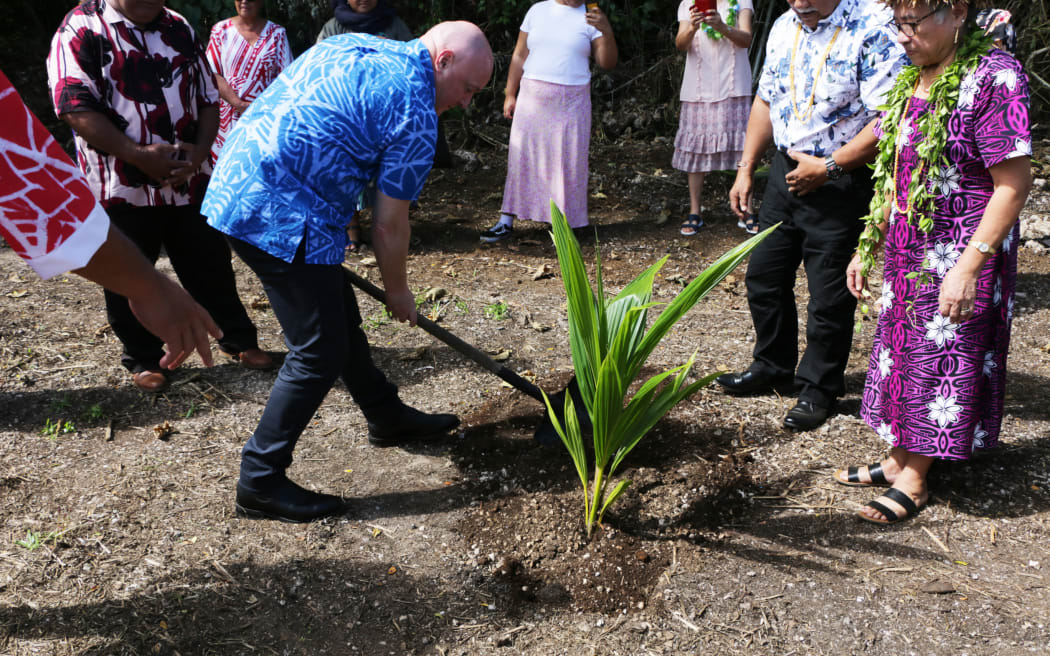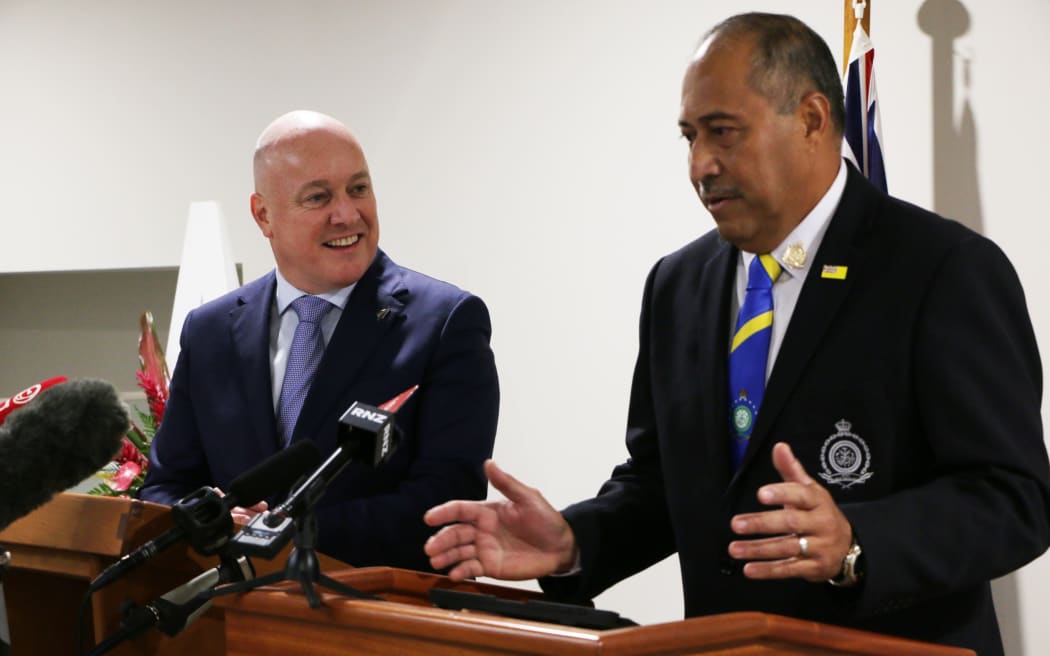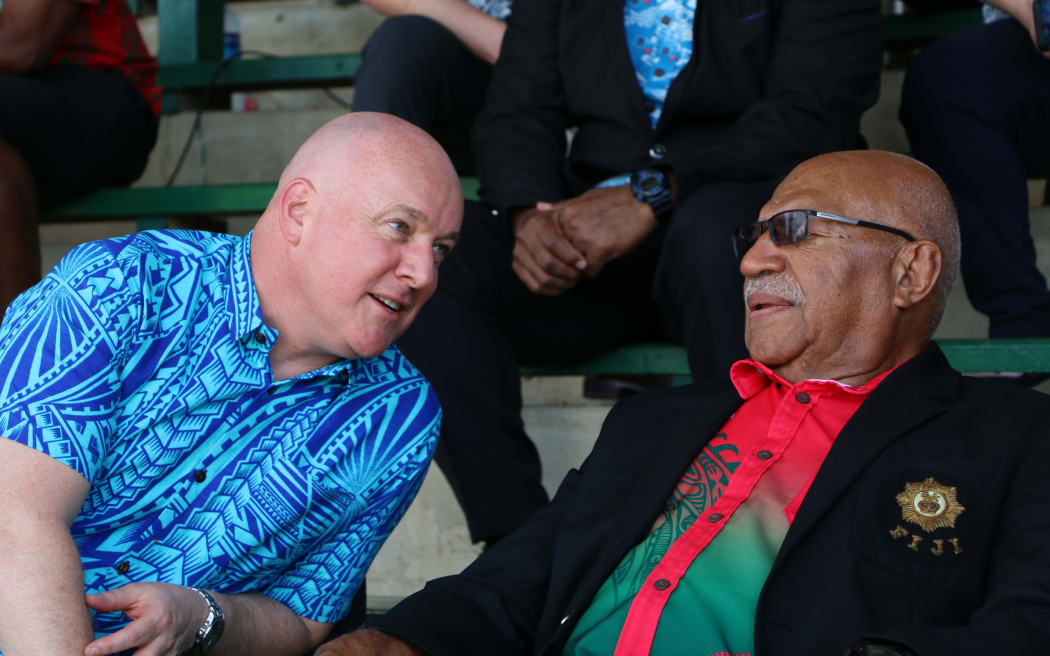By rnz.co.nz and is republished with permission
Analysis – On his first Pacific trip as prime minister, Christopher Luxon celebrated international relationships, focused on trade and business, and threw in a few ‘bald’ jokes too.

A trip to the Pacific is an easy way for a prime minister to get some space.
With a backdrop of coconut trees, beaches, and harbours at his press conferences, Christopher Luxon could re-route any difficult post-Budget questions towards his ministers back home.
Luxon says he returns from his first Pacific mission to Niue and Fiji excited and inspired, having ticked off everything he wanted to achieve: renewed friendships, some meaningful investment, and more targets set.
These were not places where a New Zealand prime minister could expect to receive a welcome anything less than warm.
These are not trips where the prime minister can expect to face particularly tough challenges. Instead, they are heavy on the vibe.
When asked what his main takeaway was, Luxon said he was “really excited about the Pacific region and the potential of it, now we’ve got to all work together and make it happen”.
The trip allowed Luxon to put some runs on the board.
He made a point that he had already spoken to many Pacific leaders as they passed through Auckland, or over Zoom. But this was the first chance to stand next to them and share their visions for the next stages of the relationship.
Luxon frequently shared jokes with the other leaders in the middle of press conferences, or some good-natured sport ribbing – usually at his own expense, or at the Crusaders’.
A celebration of 50 years of Niue’s free association with New Zealand allowed for reflection and future planning, with a commitment to help the island nation transition to renewable energy.
His visit to Fiji saw the setting of a trade goal, and then a full day to get out and sell it to businesses.
The thorny issues were pushed aside, left for later, and addressed if not quite answered.
Luxon’s approach to foreign policy is to secure commitments around trade and enterprise. He sees the Indo-Pacific as the main area New Zealand should focus on, and believes that if New Zealand can make tangible contributions to another country’s economy, then that will give it the edge when other countries come knocking.
At times, it felt like a return to the campaign. In fact, that was often the point.
Luxon would frequently greet people, including senior ministers, with a “there he is” or a “hello, I’m Chris,” asking about their day and, particularly with other bald men, asking whether they shared the same barber.
Christopher Luxon planting a coconut tree in Niue. Photo: RNZ/Giles Dexter
A community lunch at a village in Niue, attended by Sir Michael Jones, allowed Luxon to cut loose and dance, while Niue’s Speaker Hima Douglas, a man of many talents, led the band.
The motorcade route from Suva’s airport to the sevusevu ceremony was dotted with enormous billboards of Luxon’s face, welcoming him to Fiji. There was some thought around whether the prime minister, who is teetotal, would partake in the kava, but he drank it with aplomb (and a grimace).
A visit to Tower Insurance ended with the entire floor of identically dressed call centre operators getting up and revealing they were also a choir.
So focused was Luxon on the handshakes and waving that at one point, after the Tower visit, he greeted his own wife, who was accompanying him on the job for the first time overseas, with the same “hello, nice to see you” cadence he had said to everyone else all morning, before quickly realising.
But the trip was also about reminding other countries investing in the Pacific that Luxon sees New Zealand as the dominant partner.
China may have contributed to Niue’s roads and the government vehicles driving on them. But Luxon saw investment in Niue’s energy as its most pressing need, with New Zealand donating $20.5 million to ensure 80 percent of Niue’s energy is renewable.
While he believes it sends a message that New Zealand is the Pacific’s partner-of-choice, some in Niue were agnostic of where the money came from, as long as it came.
Christopher Luxon and Niuean PM Dalton Tagelagi. Photo: RNZ/Giles Dexter
Niue Premier Dalton Tagelagi acknowledged that Niue was trying not to be so reliant on New Zealand for support, and was friends with everyone.
So resolutely committed to targets back home, Luxon is also setting them overseas.
Talks with Sitiveni Rabuka led to a target of $2 billion in two-way trade by 2030. Luxon said Fiji had demonstrated a desire to boost other sectors and not rely solely on tourism, and he then used every chance he got to sell that message.
A speech to Fijian and New Zealand business leaders in Nadi saw the two leaders in lockstep. As Rabuka talked of his government’s commitments to cutting red tape, Luxon, sat a few metres away, nodded and smiled. His own speech minutes later also spoke of removing red tape.
Speaking after the conference, Luxon said he felt very aligned with Rabuka.
“The challenges that Fiji encounters and the challenges we have at home, we’ve all got to deal with and face up to as leaders and find pathways to take it forward,” he said.
“We do feel we’ve got a good partner here. And I think they feel the same way about us.”
There will be plenty of countries on future itineraries where Luxon faces stronger challenges from leaders less aligned.
Luxon was also keen to highlight the centrality of the Pacific Islands Forum in any discussions around overseas investment and the influence of other nations, and that regional challenges require regional solutions.
Prime Minister Christopher Luxon watching a Sevens game between the NZDF and Fiji DF, with Fiji PM Sitiveni Rabuka. Photo: RNZ / Giles Dexter
Questions on the influence of China and the US in the Pacific, or the willingness of New Zealand to explore joining the non-nuclear part of the AUKUS agreement, were given the same answers Luxon gives back in New Zealand (an answer from Rabuka that Fiji would actually be in favour of AUKUS was later backtracked with an explanation from his press team that the prime minister had not understood the question).
“My conversations with all major power countries that have come into the region, whether it’s been the US, China, France, EU, UK, India, Japan, has been, look they are all fantastic aid partners and development partners for many of the Pacific island nations,” Luxon said.
“But it’s just important that they come through the front door and work with PIF, given that’s a very important body that I want to see esteemed and actually managing the affairs of the Pacific.”
Some other pressing needs, such as drug trafficking through Fiji, or going further on visas, were addressed with a promise to do more, but no funding or timelines.
In fact, some of the thorniest issues of all to deal with were left just a couple of hours before his final flight back to Auckland.
After news of Australia’s changes to immigration policy, a stand-up was hastily organised, with Luxon explaining he was not given a heads-up and regretted the stance Australia had taken.
Then, shortly after, with the media delegation already on the plane and about to turn on flight mode, the Electoral Commission revealed it had referred National MP David MacLeod to police over his failure to report donations.
Welcome back to New Zealand, prime minister.
Back to the winter chill, and back to the tough talks.










